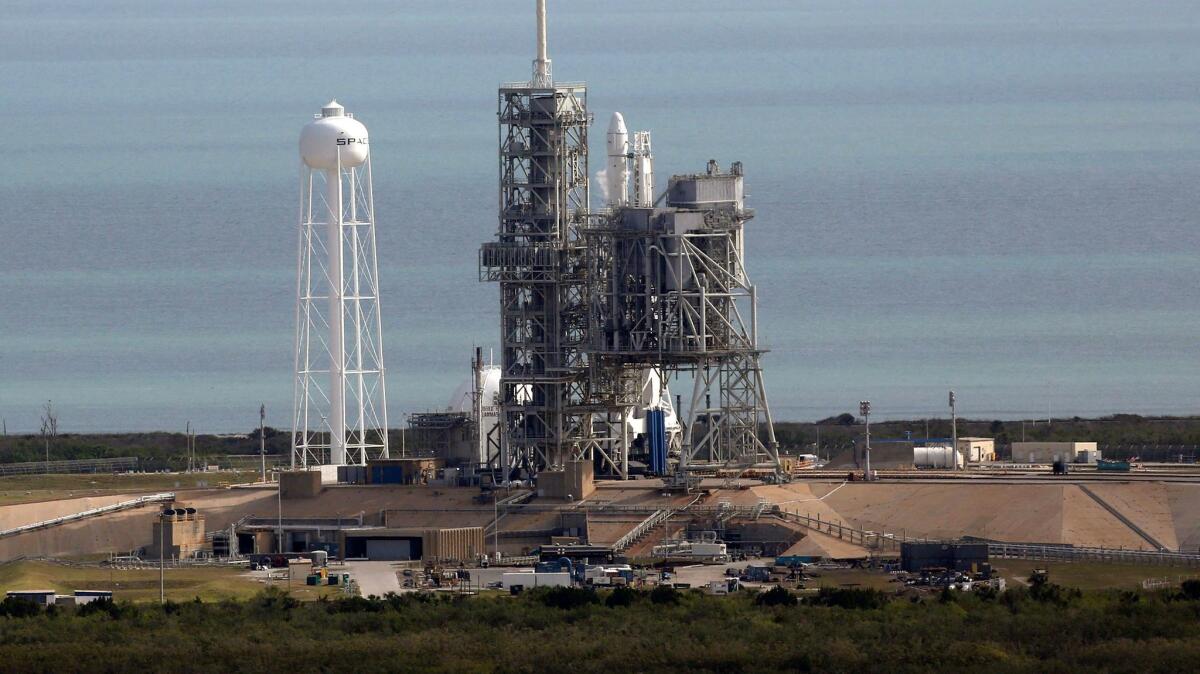SpaceX launches supplies to space station; ‘Baby came back,’ Elon Musk says of booster’s return

- Share via
SpaceX launched almost 5,500 pounds of supplies to the International Space Station on Sunday morning after scrubbing its Saturday attempt because of a potential issue with its Falcon 9 rocket.
The rocket lifted off at 6:39 a.m. PST from Kennedy Space Center in Florida. It was the Hawthorne-based space company’s first launch from Launch Complex 39A, the historic pad where the Apollo and space shuttle missions launched.
This was the first commercial launch from the pad — the last mission to lift off from 39A was the final space shuttle launch in 2011.
About eight minutes after liftoff, the first-stage rocket booster landed back on land at the company’s Landing Zone 1 at Cape Canaveral Air Force Station.
“Baby came back,” SpaceX Chief Executive Elon Musk tweeted, followed by a snapshot of the return landing.
The Dragon spacecraft, which is carrying the supplies, deployed about 10 minutes after launch. It is set to arrive at the space station early Wednesday morning.
Saturday’s launch was postponed just 13 seconds before liftoff so SpaceX could look into a potential issue with the thrust vector control system on the rocket’s second stage.
Shortly after, the company tweeted that it would take a closer look at the positioning of the second-stage engine nozzle.
“99% likely to be fine,” Musk tweeted Saturday. “But that 1% chance isn’t worth rolling the dice. Better to wait a day.”
SpaceX determined that the potential issue was with one of two thrust vector control actuators, which help steer the second-stage engine nozzle through flight, Jessica Jensen, Dragon mission manager for SpaceX, said in a post-launch news conference.
The company replaced the actuator Saturday night and then ran tests on the pad before launch, she said.
This was the company’s second launch since a launch pad explosion in September destroyed a Falcon 9 rocket and a commercial communications satellite.
Sunday’s launch was SpaceX’s 10th mission to deliver supplies to the space station for NASA.
This is the beginning of what SpaceX hopes will be a busy period for Launch Complex 39A.
The pad has been configured to accommodate the first flight of the company’s highly anticipated heavy-lift rocket, Falcon Heavy, as well as the first flight of a previously launched first-stage booster, which is slated for March, Jensen said.
The company is hoping to launch from Pad 39A again in about two weeks, she said.
Meanwhile, Jensen said renovations will continue on Space Launch Complex 40 at Cape Canaveral, which was damaged during the September explosion. SpaceX has completed all of its inspections at the launch pad but still needs to do “a majority of the work there,” Jensen said.
During a Friday briefing with reporters, SpaceX President Gwynne Shotwell said Space Launch Complex 40 should be operational by the summer.
Twitter: @smasunaga
UPDATES:
9:21 a.m.: This article was updated with details from a post-launch news conference.
8:45 a.m.: This article was updated with reaction from Elon Musk.
6:59 a.m.: This article was updated to include details of the launch.
This article was originally published at 5:30 a.m.
More to Read
Inside the business of entertainment
The Wide Shot brings you news, analysis and insights on everything from streaming wars to production — and what it all means for the future.
You may occasionally receive promotional content from the Los Angeles Times.











